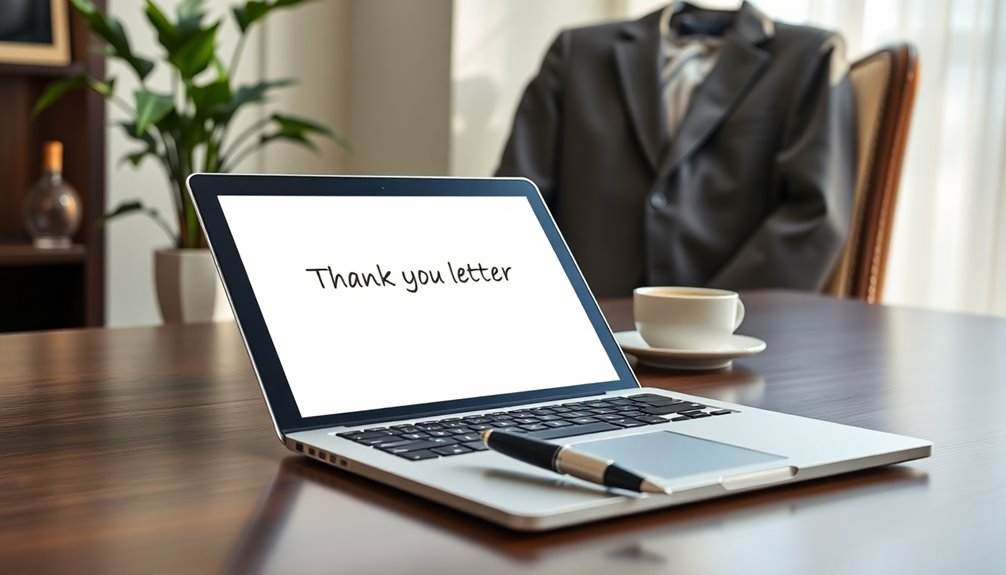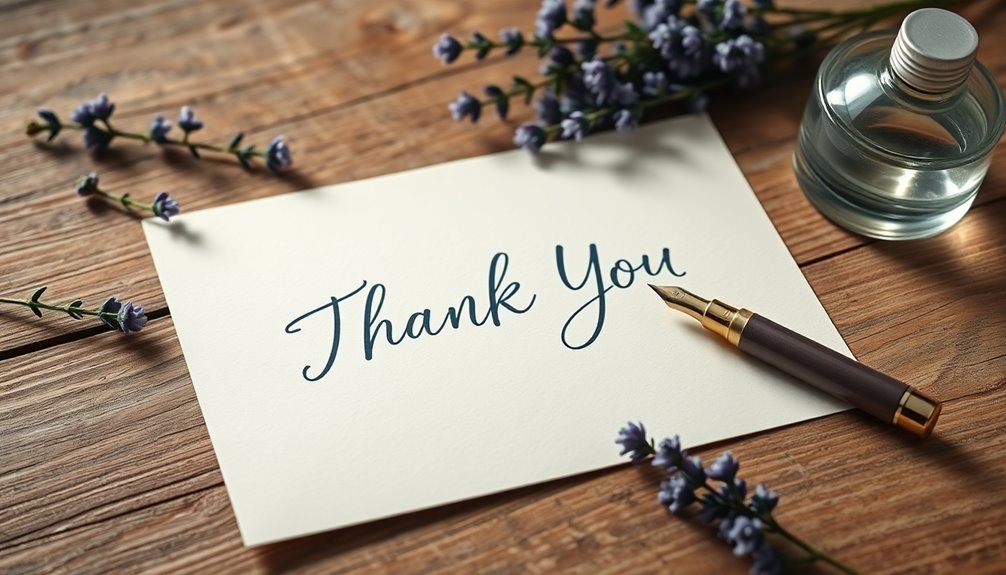Sending a thank you letter after your job interview is a smart move. It shows professionalism and reinforces your interest in the position. Do it within 24 hours for the best impact. Personalize your message by mentioning specific points you discussed, which helps you stand out. If you interviewed with multiple people, address them all in one email to maintain consistency. This letter is also an opportunity to highlight your qualifications and offer further information. With these tips, you can increase your chances of sealing the deal. There's more guidance on how to craft the perfect letter waiting for you!
Key Takeaways
- Thank you letters significantly influence hiring decisions and can enhance your candidacy by reinforcing interest in the position.
- Sending a thank you email within 24 hours shows proactivity and keeps you memorable to interviewers.
- Personalize your thank you notes by referencing specific discussion points from the interview to demonstrate attentiveness.
- If you interviewed with multiple people, send one collective email to maintain consistency and professionalism.
- Following up after a rejection with gratitude and interest in future openings can help maintain valuable relationships.
Importance of Thank You Letters

Thank you letters are often overlooked, yet they play an important role in the job interview process. Sending a thank you note isn't just a nice gesture; it can greatly influence hiring decisions. In fact, 80% of hiring managers find these notes helpful in evaluating candidates. By taking the time to send your thank you, you demonstrate professionalism and courtesy, something that 91% of hiring managers appreciate post-interview.
These notes also provide you with a final opportunity to reinforce your interest in the position. They can be particularly crucial in a competitive job market where candidates might have similar qualifications. In fact, candidates who send thank you notes are 22% less likely to be eliminated from consideration compared to those who don't.
Moreover, acknowledging the interviewer's time enhances relationship building, increasing your chances of follow-up communication. A well-crafted thank you note not only leaves a lasting impression but also differentiates you from others. So, don't underestimate the power of a simple thank you; it could be the factor that tips the scales in your favor.
Timing for Sending Emails

Sending a thank you email promptly after your interview can greatly impact your candidacy. Ideally, you should send your email within 24 hours. This timing demonstrates your enthusiasm and respect for the hiring manager's time. If you wait too long, your name may fade from the interviewer's memory, making your message less effective. Here are some key points to reflect on:
- Early thank you notes can give you a competitive edge.
- It reinforces your interest in the position and the company.
- A prompt follow-up shows you're proactive and engaged.
- While immediate sending is encouraged, prioritize quality over speed.
Key Elements to Include

When crafting your thank you letter, start by expressing genuine gratitude for the interview opportunity. Highlighting key discussion points shows you were engaged and attentive during your conversation. This not only reinforces your interest but also keeps you memorable in the interviewer's mind.
Expressing Genuine Gratitude
A heartfelt thank you letter can greatly impact your job application process, leaving a lasting impression on your interviewer. When you take the time to express genuine gratitude, you reinforce a positive image and show appreciation for their time and insights. Here are key elements to reflect on:
- Thank you for taking the time to meet with me.
- I truly enjoyed our conversation about [specific topic].
- I'm excited about the possibility of joining your team.
- If you need any additional information, feel free to ask.
Highlighting Key Discussion Points
Highlighting key discussion points from your interview can greatly strengthen your thank you letter. By mentioning specific topics discussed, you reinforce attentiveness and showcase your active listening skills. Recapping these points not only emphasizes your qualifications but also aligns your insights with the company's mission, demonstrating your cultural fit.
Here's a simple table to help you organize your thoughts:
| Key Discussion Points | Personal Insights | Appreciation for Interviewer's Time |
|---|---|---|
| Role requirements | How my background aligns | Thank you for the opportunity |
| Project examples | Values and mission alignment | Grateful for your insights |
| Team dynamics | Collaborative approach | I appreciate your time and interest |
| Challenges discussed | Problem-solving experiences | Looking forward to next steps |
| Future goals | Vision for the role | Enthusiastic about potential contributions |
As you weave these elements into your thank you letter, remember to express gratitude for the interviewer's time. This not only reinforces your appreciation but also highlights your understanding of the role and your readiness to contribute effectively. Additionally, being aware of state tax implications can help you manage your finances better as you transition into your new role.
Handling Multiple Interviewers
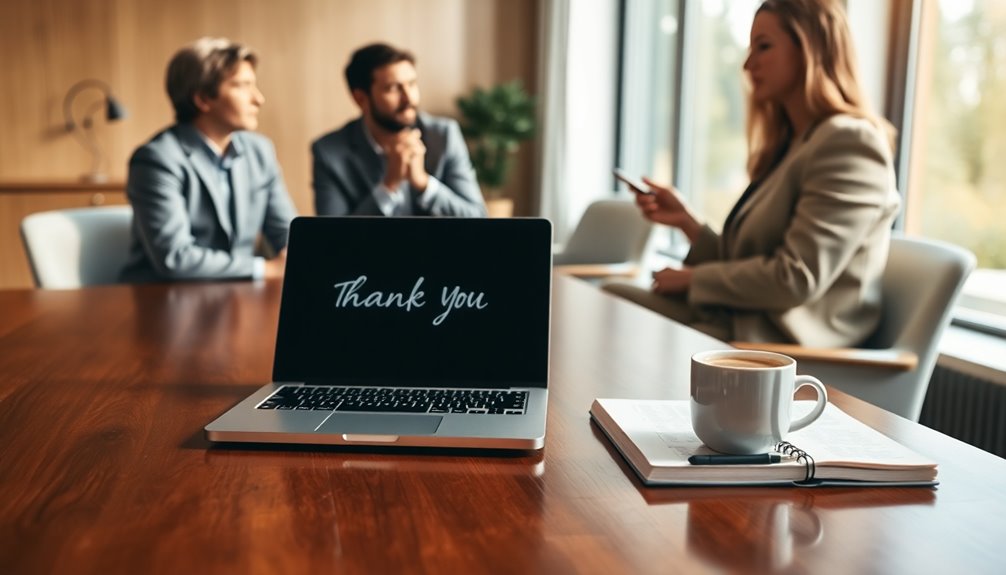
Maneuvering interviews with multiple interviewers can be intimidating, but handling it well can set you apart. To make a strong impression, consider these interview tips:
- Send one thank you email to all interviewers.
- Include each person's name in the CC field.
- Personalize your message with specific references to your discussions.
- Express appreciation for the opportunity and highlight your enthusiasm for the role.
By sending a collective thank you email, you not only save time but also guarantee consistency in your communication. This approach reinforces your professionalism and demonstrates your ability to manage multiple stakeholders effectively. It's a desirable trait in many roles.
In your email, mention that it was a pleasure speaking with each interviewer and reference specific points from your discussions. This personalization strengthens rapport and can positively influence the hiring decision. If any of the interviewers have further questions, don't hesitate to encourage them to feel free to contact you. A thoughtful thank you email can truly be the icing on the cake, showcasing your proactive nature and interest in the position.
Formatting Best Practices
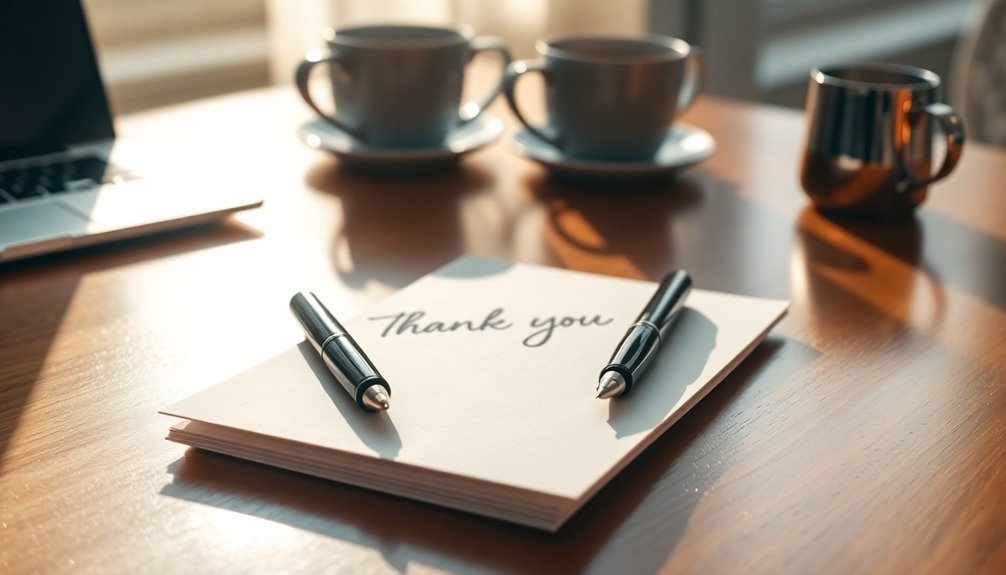
When crafting your thank you email, it's important to set it up right from the start. Use a clear and specific subject line, such as "Thank You for the [Position] Interview," to guarantee your email stands out. This not only helps the interviewer identify your email quickly but also sets a professional tone.
Keep your message concise—ideally a few short paragraphs—to maintain the interviewer's attention and respect their time. Proper formatting plays an important role in readability. Use appropriate spacing and paragraph breaks to make your email visually appealing.
Here's a quick reference table to guide you:
| Best Practices | Tips |
|---|---|
| Subject Line | Be clear and specific |
| Professional Tone | Use formal language |
| Concise | Limit to a few short paragraphs |
| Email Timing | Send within 24 hours |
| Proofread | Check for errors and typos |
Lastly, always proofread your email. Attention to detail enhances your professionalism and credibility, making a lasting impression!
Highlighting Your Qualifications
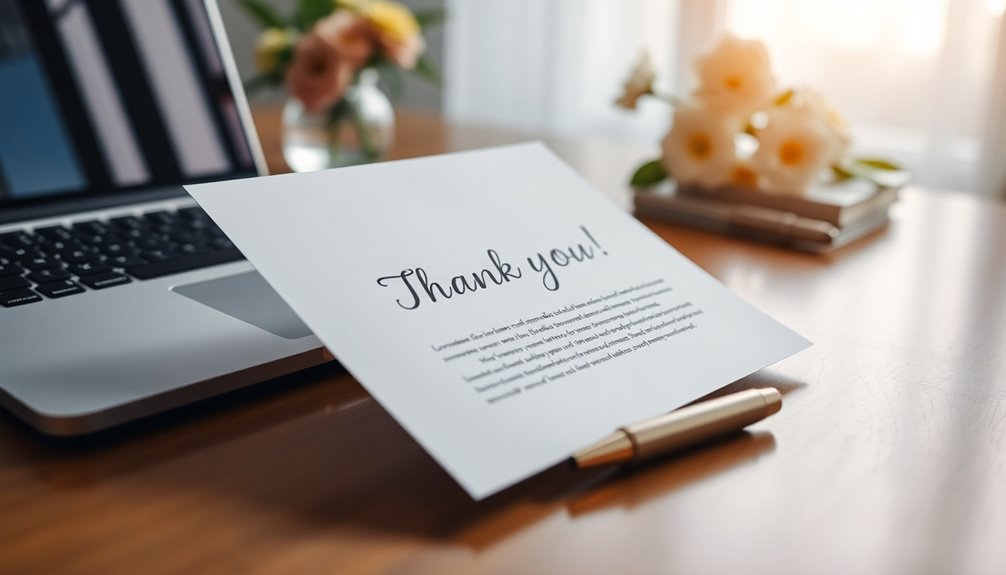
When you highlight your relevant skills in your thank you email, you reinforce why you're the right fit for the job. Including links to projects or your portfolio can give the hiring manager concrete examples of your achievements. By expressing confidence in your ability to contribute, you not only leave a strong impression but also show your alignment with the company's goals.
Relevant Skills Emphasis
Highlighting your relevant skills in a thank you letter can considerably reinforce your qualifications for the position. A well-crafted thank you email not only expresses your appreciation but also serves as an opportunity to remind the interviewer of your fit for the role. Here are some key points to reflect upon:
- Align your skills with the company's needs.
- Mention specific experiences that demonstrate your qualifications.
- Include any relevant skills not covered during the interview.
- Tailor your message to reflect the organization's goals.
By emphasizing these relevant skills, you help the hiring manager recall your qualifications, making it easier for them to envision you in the role. Additionally, referencing specific experiences can paint a fuller picture of your capabilities and potential contributions to the team. This approach shows that you've done your homework and understand the company's needs, enhancing your candidacy.
Ultimately, a thoughtful thank you email can increase the likelihood of follow-up communication, keeping you top of mind. Take the time to highlight your skills effectively, and you'll make a lasting impression that could set you apart from other candidates.
Project Links Inclusion
Including links to your relevant projects in a thank you email can greatly enhance your presentation of qualifications. By showcasing your work, you provide concrete examples that reinforce your fit for the job. Make certain the projects you link to align closely with the job's requirements, demonstrating your understanding of the position and your proactive attitude.
| Project Name | Key Achievement |
|---|---|
| Project A | Increased efficiency by 30% |
| Project B | Successfully led a team of 5 |
| Project C | Improved client satisfaction rates |
Feel free to mention these links in the context of your interview discussion. This not only highlights your engagement but also allows you to provide additional insights into your capabilities. When you send the email, include a brief description of each project, emphasizing specific achievements or experiences. This can differentiate you from other candidates, showcasing your unique contributions. Ultimately, providing easy access to your portfolio or work samples enhances your credibility, making it easier for the interviewer to review your past work. The next step is to make certain your thank you email is polished and professional. Additionally, consider incorporating projects that demonstrate your skills in problem-solving to further illustrate your qualifications.
Confidence in Fit
Expressing confidence in your fit for the position within your thank you email can greatly impact how interviewers perceive you. When job seekers convey their qualifications effectively, it reinforces their interest in the position and boosts their chances of standing out. Keep in mind these key points when crafting your email:
- Highlight relevant achievements that align with the job requirements.
- Mention skills or experiences not discussed during the interview.
- Provide links to your professional work or portfolio.
- Use specific examples to demonstrate your capability and value.
When you articulate your strengths, it shows the interviewers that you not only understand the role but also feel ready to take it on. This confidence can instill assurance in them regarding your ability to contribute effectively to their team. Don't shy away from reiterating your relevant qualifications; it reminds them why you're a strong candidate. By crafting a thoughtful email that emphasizes your fit, you create a lasting impression and solidify your position in their minds. This step could be the key to sealing the deal on your next opportunity.
Follow-Up Etiquette

After your job interview, it's essential to master follow-up etiquette to keep your candidacy fresh in the employer's mind. Start by sending a post-interview thank-you email within a week, expressing your continued interest in the position. This initial follow-up reinforces your enthusiasm and helps establish a professional tone.
If you don't hear back after your thank-you email, wait at least a week before sending another email, as overwhelming the interviewer could have the opposite effect. In your subsequent follow-up, politely inquire about your application status. Frame your message to offer any additional information or clarification that might assist in their decision-making process.
Personalized follow-ups can greatly improve your chances of receiving a response. Mention specific points discussed during the interview to demonstrate your attentiveness and strengthen the candidate-employer relationship. By balancing persistence with professionalism, you create an impression that you're genuinely interested in the role while respecting the employer's time.
Mastering follow-up etiquette not only shows your dedication but also positions you as a thoughtful candidate, making it easier for the employer to remember you during their hiring process.
Responding to Rejections

Facing a job rejection can be disheartening, but responding graciously is essential for maintaining a positive relationship with the interviewer. A well-crafted response can keep you in good standing for future opportunities. Here are some key points to reflect upon when responding to rejections:
- Express gratitude for the interview experience and the chance to learn about the company.
- Request feedback on your interview performance to gain valuable insights for your next application.
- Follow up with an expression of interest in future job openings to stay on their radar.
- Demonstrate professionalism and resilience in your communication, showcasing qualities that employers value.
Frequently Asked Questions
How Do You Write a Killer Thank You Note After an Interview?
To write a killer thank you note after your interview, send it within 24 hours. Personalize your message by mentioning specific topics you discussed, showing genuine interest in the role. Recap key points from your conversation and add any relevant information you didn't cover during the interview. Keep a professional tone while expressing gratitude and enthusiasm for the next steps. Finally, proofread carefully to avoid errors that could hurt your chances.
What Is an Example of a Thank You Message After an Interview?
Imagine the interviewer's smile as you express your gratitude. A great thank you message might read: "Hi [Interviewer’s Name], thanks so much for the opportunity to discuss the [Job Title] position. I loved hearing about [specific project or topic], and it's clear you're building something amazing at [Company Name]. I'm excited about the possibility of joining your team. Looking forward to hearing from you soon!" Keep it sincere and personal!
What Is an Example of a Thank You Letter for Job Interview?
After your job interview, you should send a thank you letter that starts with a personalized greeting. Express your gratitude for the opportunity and briefly recap key discussion points to show you were engaged. Mention a shared interest or anecdote to strengthen your connection. Reiterate your excitement about the position and the company before closing with a professional sign-off. Invite further communication to keep the conversation going and leave a lasting impression.
How to Write a Thank You Email After Interview Template?
To write a thank you email after your interview, start with a clear subject line. Use a personal greeting and express your gratitude for the opportunity. Recap specific points discussed during the interview to reinforce your interest. Mention any shared insights or interests to personalize the message. Finally, close with a statement that reflects your enthusiasm for future communication. Make sure to proofread for clarity and professionalism before hitting send!
Conclusion
In the job search journey, a thank-you letter is like a lighthouse guiding your ship through foggy waters. It not only reinforces your interest but also illuminates your qualifications, helping you stand out. Remember, sending it promptly and thoughtfully can seal the deal. Just as sailors rely on lighthouses to navigate, hiring managers appreciate clear, considerate communication. So, take the time to craft that letter—it could be the beacon that leads you to your dream job!
